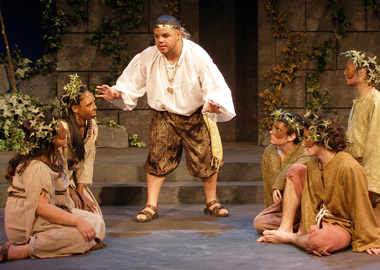I was initially struck by the juxtaposition: a Greek tragedy—and a rather obscure one, at that—performed by students at a community college that I didn’t even know had a theater program. Then, when I saw Euripides’ The Bacchae last weekend at Springfield Technical Community College, I was struck by the beauty and power of the production itself.
The 19 students in the cast and crew are majoring in things like dental hygiene and criminal justice, and for several of the actors it was their first time on stage. The performance, directed by STCC professor Greg Trochlil, was the culmination of this semester’s Theater Workshop, which I discovered has been going for decades. It’s a take-all-comers production class where the choice of script is governed by who signs up for the course—this semester, many more men than women—and by the director’s sense of adventure.
The Bacchae is one of those cautionary tales in Greek tragedy where the lesson—”Don’t mess with the god”—is ultimately written in blood. Here the god is Dionysus (Bacchus), lord of revelry and ecstatic abandon, whose worship is banned by the austere and uptight young king, Pentheus, whose own mother is one of Dionysus’ votaries.
Trochlil told me he chooses plays that will both challenge the students and expand their sphere of knowledge: “I will always set the bar higher than they can go.” But he acknowledged that it isn’t just the material that’s a challenge. These Springfield-area students “are supporting themselves. They’ve got jobs. Two of them have kids. It shows how dedicated they are.”
Last Saturday, Trochlil’s cast was reaching higher than many of them thought they were capable of. This is tough material. Lengthy monologues outweigh give-and-take dialogue and detours into classical mythology tangle the dramatic thrust. While the actors’ varying levels of experience were evident, there was a unanimity of passion, commitment and, perhaps most impressive, clarity, as the actors negotiated the ancient text.
After the performance, the cast gathered on stage to talk about the play and the process. All agreed that at first it felt like a hopeless challenge. “When we did the first read-through,” explained Eddie Gonzalez, who played Dionysus with an almost frightening intensity, “we were like, ‘This is impossible. It’s not going to happen.'”
Joshua Dufresne said he finally got a handle on the character of Tiresias, the blind prophet, when he obtained a pair of milky-white contact lenses, adding with a grin, “Scaring little kids is a plus, too.” Andrew Brown, as the messenger who relates the gory death of Pentheus at the hands of wine-maddened maenads, used his love of hip-hop to give staccato rhythms to his body and voice. Erika Ramos Rivera said she employed color imagery to inform her role as leader of the chorus. Her dominant color was red—red for blood, for wine, for the feeling of being “mad and crazy and in a fury of emotion.”
I was struck, finally, by the cast’s spirit of joyful adventure—the spirit, in fact, of Dionysus, who wasn’t just a party animal, but the god whose festivals gave birth to the mystery we call theater.
Chris Rohmann can be reached at StageStruck@crocker.com.



